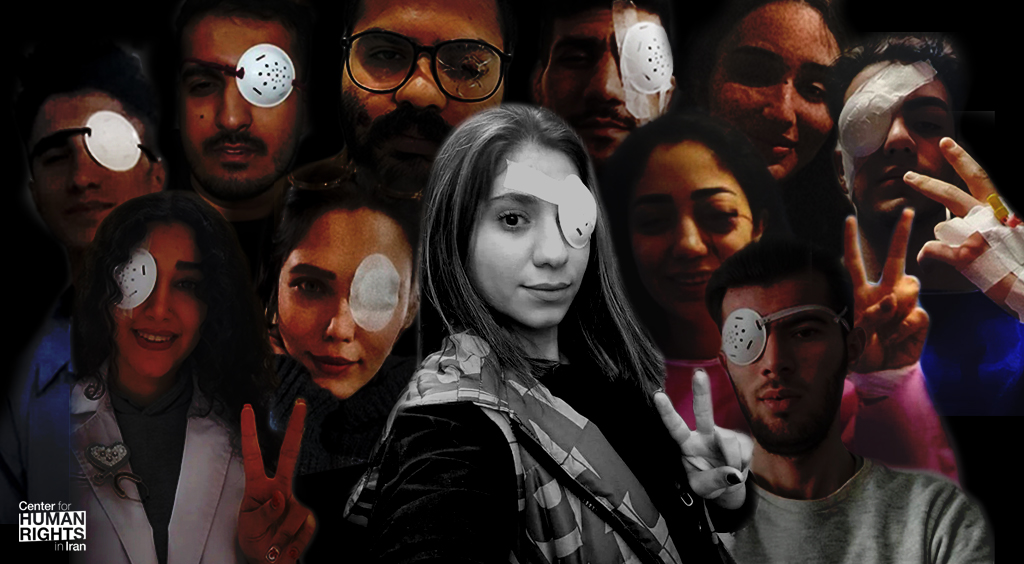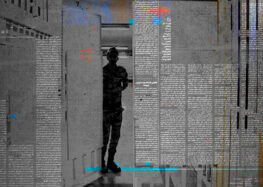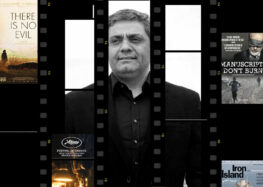Iran: Scores Blinded as Security Forces Aim Guns at Protesters’ Eyes

Protesters: “We Aren’t Afraid of the Darkness”
In their violent drive to crush the anti-state protests that have roiled Iran over the last five months, Islamic Republic security forces have shot scores of young protesters directly in the eyes, resulting in the loss of sight in one or both eyes in numerous individuals.
So far, 26 people (names below) have made their visual-impairment public, while many others have chosen to remain silent out of fear of state reprisals, the Center for Human Rights in Iran (CHRI) has learned.
Many protesters fear treatment in hospitals, which are patrolled by security forces, and there have also been consistent reports for months that wounded protesters have been denied treatment or arrested after treatment. Doctors tending to the wounded have also been arrested by Islamic Republic security forces.
While the use of violent state force against peaceful protesters is a violation of both Iran’s constitution and its obligations under the International Covenant on Civil and Political Rights (ICCPR), shooting directly at peaceful protesters’ eyes is an egregious violation of the UN Basic Principles on the Use of Force and Firearms by Law Enforcement Officials, which requires that law enforcement officials use force only when “unavoidable” and exercise restraint to “minimize damage and injury.”
CHRI spoke with the following individuals, who were blinded by security forces in at least one eye and who agreed to share details of their experiences on the condition of anonymity to protect their security.
“Reza”: Don’t Give Away My Identity
“When our group photo was posted online, one of us was arrested and the rest were summoned and charged,” said 26-year-old “Reza” in an interview with CHRI.
“Before that, the security agents raided some of our homes and put pressure on us to march on the anniversary of the [1979 Iranian] revolution on February 11 or to attend the finale of the (state-sponsored) Fajr Film Festival, but we refused. That’s why it’s very important to protect my identity for my safety. I’m asking you not to mention my city because it’s the first time I’ve dared to go back home in three months.”
Regarding the day he was shot, Reza recalled: “On November 16, 2022, our city, like many other cities, was witnessing protests. I was in the front, chanting slogans. The police were lined up opposite us. We used trash bins and anything else we could find to protect ourselves from their guns. It was a big crowd, all pressed together. We didn’t think they would shoot us but as I was chanting, suddenly my body got heavy and I felt a strong pain in my head. Everything turned white, like an explosion of light.”
He continued, “My friends took me into a side street. One of the residents opened the door to her house and we hurried into the courtyard. When I opened my eyes, one of my friends saw the pellets. They weren’t lodged too deeply; we slowly removed two of them by hand.
“When calm returned to the street, we went to a private clinic on the same street. They didn’t have an eye specialist. We said my eye had been injured during a game but the doctors and nurses knew what had happened. They washed and patched up my eye and insisted I should see a specialist.”
Reza, along with his father and uncle, went to see an ophthalmologist in the city where he was born.
“We drove at night. It was a big risk. We finally got there and I was fortunate that the pellets had not been lodged in my eye or else God knows it would have been worse.”
Amir Velayari: Not Afraid of Darkness
Amir Velayati lives in Tehran. He is a bright young man. “You aimed at my eyes, but my heart is still beating” is the motto on his Instagram page.
One of Velayati’s relatives told CHRI, “Amir worked as a hairdresser but since he lost his left eye, he’s been having severe headaches and sometimes he faints. He might never be able to go back to work.”
Velayati was struck by pellets in his eye, chest and arm during a protest in Tehran on September 24, 2022. Despite heavy bleeding from his left eye, which received the most damage, none of the hospitals he went to would help that night.
Treatment began two days later at an anonymous location but to this day a pellet remains lodged in the back of his left cornea.
“We aren’t afraid of darkness, even if there’s no more light,” he wrote on his Instagram.
Ghazal Ranjkesh: Revealing the Truth
Seventy days after the start of the “Woman, Life, Freedom” movement, Ghazal (Mohadeseh) Rankesh’s photo began to trend among Iranians on social media. She is a 21-year-old law student living in the port city of Bandar Abbas.
A source close to Ranjkesh said in an interview with CHRI, “It’s clear from Ghazal’s writings that she has lots of goals. She’s interested in make-up and skin care. She writes poetry and stories. If she wasn’t a storyteller, she couldn’t have recalled this crime with such passion that inspired other victims to break their silence.”
Ranjkesh was returning home with her mother when she was struck and blinded in her right eye by pellet shots on November 15, 2022. Only hours following an operation on November 22, she wrote:
“After spending four hours in class, and nine hours at work, I was going home to get some rest… The last image that registered in my right eye was the man’s smile before he shot me. He didn’t know I was bullet-proof. He didn’t know my heart and soul were stronger than to tremble in front of his gun. I wasn’t going to step back and let my mother get shot!”
In a short time, her brief note was enough to inspire the creation of a network of people who could share and publicize their experiences of becoming visually impaired as a result of shots fired by the Islamic Republic forces.
Doctors Express Concern
On November 25, 2022, more than 120 ophthalmologists raised a red flag following many referrals: “During recent protests, there have been a large number of patients in medical centers with eye injuries caused by birdshots, paintballs and the like, who often lose one or both eyes. Therefore, it is necessary to report this situation to the relevant authorities and give necessary warnings about the irreparable consequences of such severe eye injuries.”
Also on November 27, students at Tehran university’s College of Fine Arts made a performance in solidarity with Ghazal and other victims who were shot in the eye.
According to a report published by The New York Times on November 23, 2022, ophthalmologists from three large hospitals in Tehran — Farabi, Rasoul Akram, and Labbafinezhad — “estimated that their wards had admitted a total of more than 500 patients with grave eye injuries since the start of the protests in mid-September. Many have arrived with metal or rubber fragments still lodged in their heads. Doctors in Kurdistan Province in the north estimated that they had treated at least 80 such patients. Exact figures are difficult to determine as many protesters are too afraid to seek treatment in public hospitals.”
In addition, an investigation by London-based IranWire on January 9, 2023, showed “Hundreds of Iranians have sustained severe eye injuries after being hit by pellets, tear gas canisters, paintball bullets or other projectiles used by security forces amid a bloody crackdown on four months of mainly peaceful anti-government demonstrations.”
In response, Hassan Karami, commander of the police special units, on January 31, 2023, denied that his forces would deliberately harm protesters on specific parts of their bodies. He said such claims were “propaganda” spread by the Islamic Republic’s enemies.
Meanwhile, some of the victims continue to make public statements and appearances. On February 12, 2023, a group of them went to a theater in Tehran to see a play in which Kowsar Eftekhari, one of the victims, had a role.
Victims of blinding by state security forces who have made their names public:
1- Raheleh Amiri
2- Mohsen Kafshgar
3- Mohammad Farzi
4- Niloofar Aghaie
5- Ghazal Ranjkesh
6- Helia Babaie
7- Elaheh Tavakolian
8- Amir Velayati
9- Farid Rashidi
10- Kowsar Khoshnoudikia
11- Kowsar Eftekhari
12- Kimia Zand
13- Yasser Alvandiani
14- Ali Mohammadi
15- Hossein Abedini
16- Behzad Hamrahi
17- Hossein Hosseinpour
18- Parviz Yari
19- Hossein Nouri
20- Sadegh Soufi
21- Hossein Bagherpour
22- Nachirvan Maroufi
23- Bita Kiani
24- Firooz Mirani
25- Parsa Ghobadi
26- Ali Mohammad Rezaei






